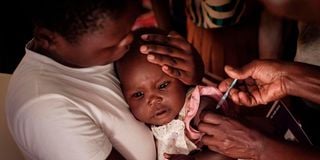Most countries are not vaccinating children against Covid-19; this is why they should

The debate regarding whether or not to vaccinate children against Covid-19 is seen through three lenses: immunogenicity, safety and effectiveness.
The debate regarding whether or not to vaccinate children against Covid-19 is seen through three lenses: immunogenicity, safety and effectiveness.
Immunogenicity is the ability of a foreign substance, say a vaccine or antigen, to provoke an immune response in the body of an individual. If a substance can cause an immune response, we need to know both the immediate and long-term side effects.
This also ties in with safety: what quantity is safe? Once we know about a vaccine’s safety, it is important to understand the extent or level of protection offered by the drug, that is, effectiveness. For how long is the child protected? When will they need a second dose or booster? What quantity is safe and at what ages?
The disproportionate infection by age in children explains why most countries in Africa are not vaccinating children. So far, only children aged 12-17 years are getting the jab.
In Kenya, children are only eligible for Covid-19 vaccines if they are aged 15-17 years. These are mostly children in upper primary and high school. So far, 2.7 million children have been vaccinated in Kenya, leaving most in the country uncovered.
There are children who are at increased risk of suffering severe Covid-19 infection, such as those with underlying conditions. According to Lake Region Economic Bloc (LREB)’s data, some children who were tested for Covid-19 also had cardiovascular disease, HIV, diabetes, pregnancy, lung disease, cancer and hypertension. Most of these children have received doses of the vaccine, yet some still experienced breakthrough infections.
These are children who got tested in health facilities because they needed medical attention, and the level of their discomfort could not be managed at home.
It was not voluntary testing. Out of 9,496 children aged between 0-17 years who were tested in various LREB health facilities between December 2021 and July 2022, 847 who tested positive for Covid-19 also had various comorbidities. The most common underlying conditions were diabetes and HIV, in that order.
As we discovered from LREB data, whenever children contract Covid-19, whether mild or severe, they present with cough, fever, sore throat, general body weakness, headache, running nose, difficulty breathing, pain, and loss of both taste and smell.
The data also showed that a child with diabetes was 14 times more likely to test positive for Covid-19. A child with HIV is 36 times more likely to contract Covid-19 compared to one who is HIV-negative.
Given the rising number of children with underlying conditions, relevant authorities should prioritise protecting children at risk through vaccination and timely testing whenever necessary. Like adults, vaccination of children significantly reduces the chances of experiencing severe outcomes

Prof. Shem Otoi. He is the Programmes Co-ordinator, Lake Region Economic Bloc (LREB) Covid-19 Advisory Committee.
Why children experience mild infections
In relation to their immunogenicity, children’s melatonin levels play a role in making their infections milder. Melatonin is a hormone that regulates the sleeping and waking cycle. However, research has also shown that it may be responsible for children’s mild Covid-19 symptoms.
A study by Alex Shneider, Aleksandr Kudriavtsev and Anna Vakhrusheva titled “Can Melatonin Reduce the Severity of Covid-19?” that was published in the International Review of Immunology, found that the virus causes relatively minor damage to the young and healthy but presents life-threatening infections to the elderly and people with chronic inflammations. The study found that cell death caused by coronaviruses is inhibited by melatonin.
They found that, unlike adults, children have higher melatonin levels and are less likely to suffer from Covid-19. Melatonin, however, reduces with age, explaining why the elderly are at higher risk of severe infection.
So, unless children have co-morbidities and underlying conditions, they are least likely to suffer severely from Covid-19.
When we say that most children present with mild infections, it does not mean that their case is pleasant. Severity, as far as Covid-19 is concerned, is determined by the need for supplementary oxygen. One may feel downright terrible but if they are not on oxygen support, we classify that as a mild infection.
Melatonin, which is abundant in children, also inhibits the loss of oxygen in body cells.
Whether one has higher levels of melatonin, child or elderly, if they have underlying conditions and comorbidities, they will likely have severe outcomes.
Reservoirs of the virus
The downside of their resilience is that since most children present milder infections to the extent that they may be asymptomatic, they act as reservoirs of the virus. We know that asymptomatic patients are infectious — they transmit the virus to people within their personal space, even those within social distance when they sneeze.

A child receives a shot during the launch of the extension of the world’s first malaria vaccine (RTS, S)
Along the way, children have infected their elderly parents and grandparents who ended up with severe outcomes. As such, vaccinating adults and elderly with underlying conditions but failing to vaccinate children as well has been counterproductive.
There are cases where double-vaccinated immunocompromised adults have had breakthrough infections with severe outcomes. We acknowledge that vaccinating children significantly reduce their chances of getting infected and transmitting the virus to the elderly.
Clinical trials for children
Questions of an immune response, effectiveness and safety are what researchers grapple with before recommending the administration of vaccines to children. To answer these questions, many vaccine companies published their clinical trial results for scrutiny and approval.
It was found that the age of children matters when it comes to the type and quantity of vaccine to be administered. For instance, a study was conducted to evaluate the safety and effectiveness of the Pfizer BioNTech (BNT162b2) vaccine in children aged between 5 and 11 years.
They compared the immunogenicity, safety, and effectiveness of the vaccine between this group and young adults in the 16-25 years age bracket. The idea was to establish which ages respond well to what levels of vaccines. The duration it took their bodies to start generating immune responses were also observed and recorded.
The results were favourable on reactogenicity (reactions that happen soon after vaccination) and immunogenicity: there were no adverse vaccine-related side effects apart from normal injection site pain in both age groups.
In a different study, the mRNA vaccine was given to children aged between 6 and 11 years and adults in the 18-25 age bracket. The side effects observed were negligible: injection site pain, headache, and fatigue. No serious adverse side effects were observed.
These two studies explain the extent to which researchers go to ensure that vaccines are safe for children. Children below five years of age who exhibit naïve immune responses are not considered for vaccination.
Children and infections
Globally, children form 32 per cent of the population. WHO reports that one in nine cases of Covid-19 are children who account for two per cent of total hospitalisation. Whereas one in 60 cases results in death for the adult population, about one in 3,500 children who get infected with the virus die. The global distribution of death by children’s age tells a story — no one is safe until all are.
In Africa, nine per cent of total confirmed cases are in children, with 2.4 per cent of total deaths being minors. Comparing the incidence of disease by ages 0-4 years, 5-11 years, and ages 12-17, we realise that the Covid-19 pandemic was age discriminant even in children. The 12-17 age group experiences relatively disproportionate infection among children.
Future of Covid-19 in Africa
The future of Covid-19 vaccination is seasonal, much like the occurrence of influenza. In Africa, vaccination of children started after the devastating Delta variant surge. Since then, the region has experienced Omicron and its sub-variants surges. In the evolution of the pandemic, new variants present subsequent surges. Since it was first reported in Wuhan, China, in December 2019, the virus has been mutating incessantly and resulting in other sub-variants and recombinants.
Some of these variants and sub-lineages have successfully resulted in breakthrough infections with severe outcomes – even in children.
Over time, vaccine-induced immunity wanes such that people remain susceptible to breakthrough infections. For these reasons, people are advised to get the requisite two doses and a booster six to eight months apart. Children too, especially those at risk of severe outcomes due to comorbidities, underlying conditions and being immunocompromised should receive three doses of the vaccine. Many children in Africa today are at increased risk of continued infection and reinfection given that vaccination rates remain relatively low, even among adults.
Conclusion
It is advisable to vaccinate children with underlying health issues.
In the absence of universal health coverage, the cost of severe Covid-19 illness in children is too great. Many families may be reduced to abject poverty and destitution within a very short period of time because most pay for healthcare out of pocket.
Charities work to improve conditions for children in Africa, but strategic multi-sectoral partnerships between the private sector, NGOs and African governments are desired to reach the last mile before much is lost.
Partnerships in vaccinating African children will save their lives.
Prof Odhiambo is Programmes Co-ordinator, Lake Region Economic Bloc (LREB) Covid-19 Advisory Committee.




